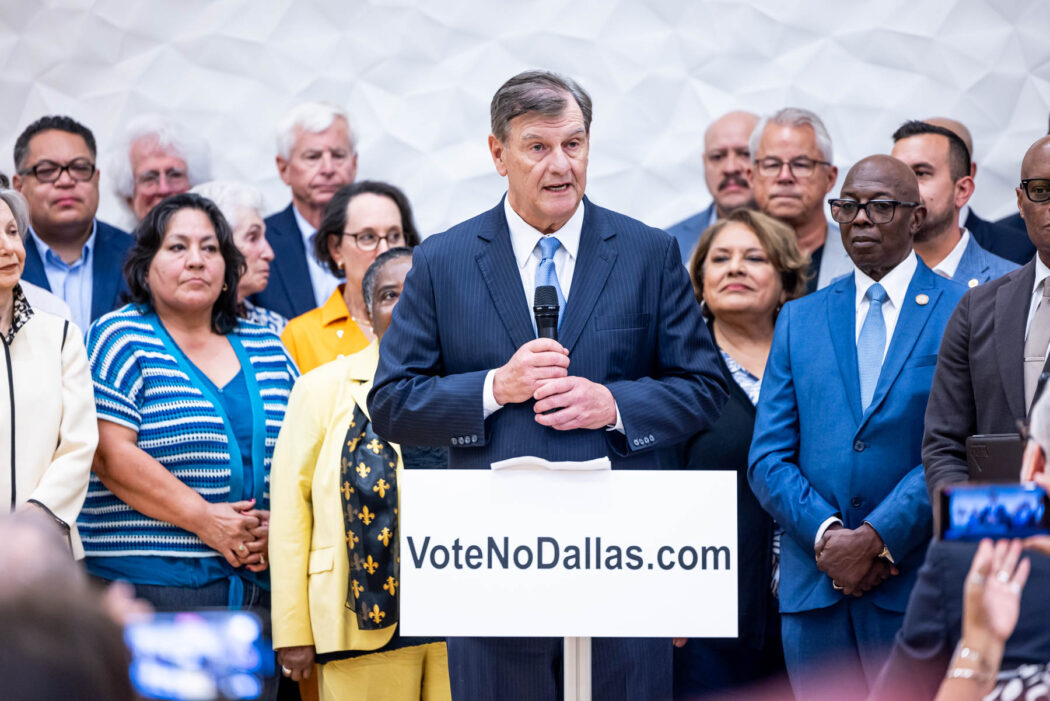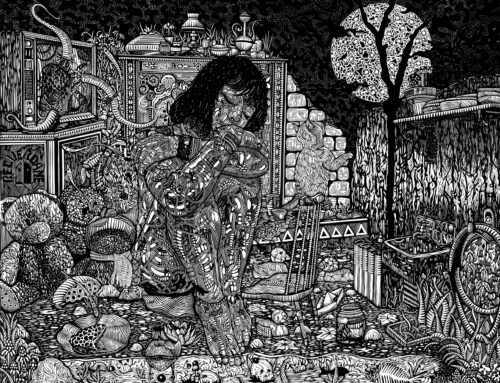City leaders in Dallas come from a variety of backgrounds and have a wide range of opinions, so it was rare to see so many come together October 2 to say they agree on one thing — residents should vote “no” on three proposed charter amendments. If the measures are approved, the bipartisan group warns, the city and its residents will face “devastating” consequences for years to come.
Dozens of current and former council members, mayors, police chiefs and other local leaders stood shoulder-to-shoulder urging voters to reject propositions S, T and U on the November ballot. If passed, the proposals would force the city to increase police pay and hire more officers, tie the city manager’s pay and employment status to a citizen survey and allow residents to sue city officials.
“Seeing this many past and present city leaders voicing their agreement goes to the deep concern in local leadership about the consequences of these amendments,” says Kathy Stewart, a retired attorney currently representing District 10 on the Dallas City Council. “On their surface, they look like they’re going to give us more accountability and more police officers, but when you dig in and see the financial and practical impact, they’d be devastating to the city budget, to city employees and to police officers who could lose their immunity and individually be subject to lawsuits.”
Alan Walne, who represented District 10 in Lake Highlands and Hamilton Park from 1996 to 2003, agrees.
“The problem is there’s just not any common sense with these proposals. Hiring another 800 or 900 police officers sounds good on paper, but what is the cost associated with that? The first problem is that every department in the country is trying to hire officers, too. We have allocated the funds to hire additional officers, we just haven’t filled all the positions currently open.
“Secondly, hiring 900 officers quickly is an enormous expense. If you do the math, you’d have to raise taxes or cut the budget to do that. In past downturns we cut library hours, closed swimming pools, had fewer code enforcement officers and delayed street repairs — no one wants that. You’re going to take cuts in those areas, and it will hurt. And what’s going to happen to our debt rating, our bond rating, if these things are passed? If you pass something that says we have to hire 900 officers, that you’ll be able to sue the city, that we’re going to do away with our immunity factors — you’re going to open a pandora’s box of lawsuits like we’ve never seen before. That’s going to be a big hole in the bucket.”
The proposed charter amendments were placed on the ballot after a petition was circulated over the summer by right-wing activist group Dallas Hero. The organization needed just 20,000 signatures to qualify but recruited more than 169,000 registered Dallas voters who signed in support.
Pete Marocco, executive director of Dallas Hero, recently spoke to Oak Cliff Advocate editor Jillian Nachtigal about the proposals. He said local residents are united in their request to get more police officers on the streets.
“It wasn’t just any one person, it was a number of people sort of crying out saying, ‘Hey, why is our police force continuing to decline in its staffing?’ We are hearing this from police. We were hearing this from members of the community. We’re particularly hearing it from people in South Dallas and West Dallas.”
Marocco said Dallas Hero’s goal is to keep a ratio of three officers to every 1,000 citizens.
“In 2015, DPD recommended exactly this change. They said they needed to get from 3,600 to 4,000 officers, but instead they lost 600, and now we’re barely above 3,000. We’re losing our police chief. When he goes, we expect we’ll probably lose even more.”
Council member Chad West represents Oak Cliff in District 1, and he agrees with creators of the petition on one point — Dallas needs more police officers on the street. How many cops and how to deploy them is where the two sides part ways.
“I subscribe to using data and studying policy and setting budgets — and we have data to go by. Our data came from the KPMG study commissioned under the leadership of (former mayor) Mike Rawlings in 2019 shortly after I joined the city council. That staffing study does not reference the city needing 4,000 officers. It does reference us needing more officers in various departments, but that doesn’t come near a 4,000 police officer number. It also talked about reallocation of resources, moving uniformed officers out of desk jobs and filling those roles with civilian personnel who are less expensive and easier to budget for, then putting those officers out onto the beat.”
District 9 Council member Paula Blackmon gets it. She hears from her neighbors in Lakewood and East Dallas who want a safe community for their families. She speaks to constituents at local events and town halls, and she reads social media posts from folks frustrated by crime. Her message? Voting for S, T and U is not the solution.
“When you look at the data, it shows that violent crime is dropping in Dallas. I understand the feelings of frustration, and I ask people when there’s been a crime committed to call 911 and report it. Nextdoor.com is not our gathering agency. We need to hear from residents that a crime has been committed. They need to report that to their local police station, because we use that data to deploy resources.
“Across the nation, hiring is just not as robust as it used to be, but this latest class had the most police recruits in a long time. The number of people wanting to get into this line of work is finally starting to perk up. It is hard work being a police officer — somebody said you’re also a social worker, a psychologist and a family therapist. We want to make sure they are well-trained and know the policies and procedures of our city and how to work with communities. So, we are working to hire more. It is in the budget, but it’s a process.”
Council member Gay Donnell Willis, representing District 13 in Preston Hollow and Vickery Meadow, says the problematic effects of S, T and U would be felt right away.
“The tens of millions of dollars required to hire, train and outfit that number of officers would dig deep into city services such as street and alley repair, park mowing, code enforcement and compliance, library hours — the list goes on. One of the benefits of having the public input process would have been discussing how much this would really cost. No one (with Dallas Hero) did a deep dive. You don’t go to Walmart and buy slingshots for these officers. They need a firearm. They need protective gear. They need something to drive. The new fleet vehicles are $100,000 each. If we order 300 of those, that’s $30 million right there.”
Willis says the measures eliminating city immunity and using citizen surveys to determine city manager pay and retention are equally worrisome.
“I can’t imagine why anyone would want to serve in law enforcement, code compliance — you can just go down the line — why you would want to work in a job that has dangerous and precarious circumstances with the public sometimes and not feel protected in your role. How are you going to get quality applicants for police chief if you don’t have governmental immunity? We would see recruitment decline across many categories, and we would also see an exodus of our current employees. We would be the only city in the country that doesn’t have governmental immunity. Using a public survey to reward or fire the city manager puts us in the same situation. How are you going to get quality applicants for city manager if their job is based on a survey of fewer than even 1% of the population?”
Two faces were noticeably absent when the “Vote No on Charter S, T and U” group held their press conference downtown — Mayor Eric Johnson and Council member Cara Mendelsohn of North Dallas. Not because they are fans of S, T and U, but because they’ve crafted a different strategy for striking the proposals down. They’re advising followers to vote against the whole shootin’ match — all 18 measures.
“What happens if every proposition fails,” they asked voters in a Dallas Morning News op-ed. “We then have the chance for a do-over. But if even one proposition passes, we will have to wait two years before any new charter amendments can be considered. This means voters have the opportunity to send a clear message to the City Council by demanding we go back to the drawing board.”
Blackmon says that idea is better than passing S, T and U, but it’s not the best option.
“I think people should read the propositions and make their own determination. I believe when they are given information, voters will make good decisions. S, T and U would gut our city manager form of government and really drive at the heart of what a municipal home rule city is, and that’s dangerous.”
Proposal S “grants standing to any resident of Dallas to bring a lawsuit against the city to require the city to comply with provisions of the city charter, city ordinances, and state law; entitles claimants to seek declaratory and injunctive relief against the city and recover costs and reasonable attorney’s fees; and waives the city’s governmental immunity from suit and liability in claims brought under this amendment.”
Proposal T would compel the city “to conduct a city-commissioned Community Survey on an annual basis, to be completed by a minimum of 1,400 Dallas residents on their satisfaction on quality of life issues, the results of which will result in the city manager earning additional performance compensation (between 0 percent and 100 percent of the city manager’s annual base salary) or the termination of the city manager.”
Proposal U would compel the city council “to appropriate no less that 50 percent of annual revenue that exceeds the total annual revenue of the previous year to fund the Dallas Police and Fire Pension, with any monies remaining of that 50% to be appropriated to increasing the starting compensation of officers of the Dallas Police Department and to increase the number of police officers to a minimum of 4,000, and to maintain that ratio of officers to the City of Dallas population as of the date of passage of this amendment.”
Early voting begins Oct. 21, and Election Day is Nov. 5. The charter amendments are at the bottom of the ballot.






